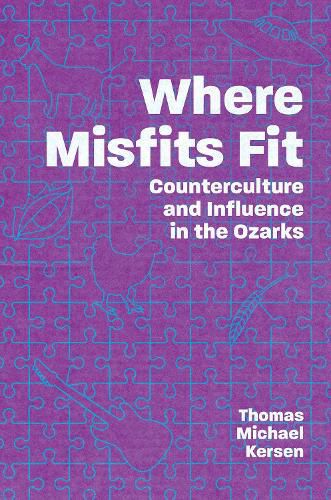Readings Newsletter
Become a Readings Member to make your shopping experience even easier.
Sign in or sign up for free!
You’re not far away from qualifying for FREE standard shipping within Australia
You’ve qualified for FREE standard shipping within Australia
The cart is loading…






This title is printed to order. This book may have been self-published. If so, we cannot guarantee the quality of the content. In the main most books will have gone through the editing process however some may not. We therefore suggest that you be aware of this before ordering this book. If in doubt check either the author or publisher’s details as we are unable to accept any returns unless they are faulty. Please contact us if you have any questions.
All regions and places are unique in their own way, but the Ozarks have an enduring place in American culture. Studying the Ozarks offers the ability to explore American life through the lens of one of the last remaining cultural frontiers in American society. Perhaps because the Ozarks were relatively isolated from mainstream American society, or were at least relegated to the margins of it, their identity and culture are liminal and oftentimes counter to mainstream culture. Whatever the case, looking at the Ozarks offers insights into changing ideas about what it means to be an American and, more specifically, a special type of southerner.
In Where Misfits Fit: Counterculture and Influence in the Ozarks, Thomas Michael Kersen explores the people who made a home in the Ozarks and the ways they contributed to American popular culture. Drawing on a wide variety of sources, Kersen argues the area attracts and even nurtures people and groups on the margins of the mainstream. These include UFO enthusiasts, cults, musical troupes, and back-to-the-land groups. Kersen examines how the Ozarks became a haven for creative, innovative, even nutty people to express themselves-a place where community could be reimagined in a variety of ways. It is in these communities that communitas, or a deep social connection, emerges. Each of the nine chapters focuses on a facet of the Ozarks, and Kersen often compares two or more cases to generate new insights and questions. Chapters examine real and imagined identity and highlight how the area has contributed to popular culture through analysis of the Eureka Springs energy vortex, fictional characters like Li'l Abner, cultic activity, environmentally minded communes, and the development of rockabilly music, and near communal rock bands such as Black Oak Arkansas.
$9.00 standard shipping within Australia
FREE standard shipping within Australia for orders over $100.00
Express & International shipping calculated at checkout
This title is printed to order. This book may have been self-published. If so, we cannot guarantee the quality of the content. In the main most books will have gone through the editing process however some may not. We therefore suggest that you be aware of this before ordering this book. If in doubt check either the author or publisher’s details as we are unable to accept any returns unless they are faulty. Please contact us if you have any questions.
All regions and places are unique in their own way, but the Ozarks have an enduring place in American culture. Studying the Ozarks offers the ability to explore American life through the lens of one of the last remaining cultural frontiers in American society. Perhaps because the Ozarks were relatively isolated from mainstream American society, or were at least relegated to the margins of it, their identity and culture are liminal and oftentimes counter to mainstream culture. Whatever the case, looking at the Ozarks offers insights into changing ideas about what it means to be an American and, more specifically, a special type of southerner.
In Where Misfits Fit: Counterculture and Influence in the Ozarks, Thomas Michael Kersen explores the people who made a home in the Ozarks and the ways they contributed to American popular culture. Drawing on a wide variety of sources, Kersen argues the area attracts and even nurtures people and groups on the margins of the mainstream. These include UFO enthusiasts, cults, musical troupes, and back-to-the-land groups. Kersen examines how the Ozarks became a haven for creative, innovative, even nutty people to express themselves-a place where community could be reimagined in a variety of ways. It is in these communities that communitas, or a deep social connection, emerges. Each of the nine chapters focuses on a facet of the Ozarks, and Kersen often compares two or more cases to generate new insights and questions. Chapters examine real and imagined identity and highlight how the area has contributed to popular culture through analysis of the Eureka Springs energy vortex, fictional characters like Li'l Abner, cultic activity, environmentally minded communes, and the development of rockabilly music, and near communal rock bands such as Black Oak Arkansas.